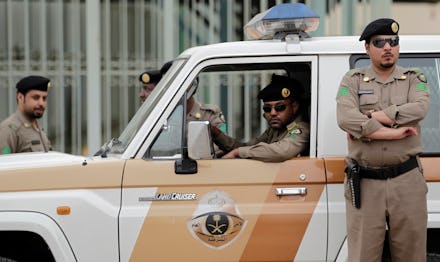Saudi Arabia Now Holds a Senior Position on the UN's Human Rights Council

One of the world's worst human rights abusers is heading an important United Nations panel on human rights.
The Times of Israel reports Saudi Arabian U.N. ambassador Faisal bin Hassan Trad was selected over the summer to head the five-member Consultative Group, an important panel on the U.N.'s Human Rights Council responsible for selecting 75 experts "with mandates to report and advise on human rights from a thematic or country-specific perspective."
Columbia University expert Agnes Callamard told the Daily Beast "the composition of the advisory group is five representatives from all regions. It is a rotation within regions, so nobody appoints anybody."
As the Daily Beast explains, Saudi Arabia was one of five countries selected after being nominated by "their representatives, usually by rotation and by consensus." The other four countries selected from the 47 members of the UNHRC were Algeria, Chile, Lithuania and Greece.
Because of this procedural aspect of the selection process, some argue Saudi Arabia's membership on the committee is not a big deal. On Sunday's edition of ABC's The Week, U.S. ambassador to the U.N., Samantha Power, said Saudi Arabia was only being given a "procedural position" that would not "have bearing on what the U.N. is doing on any particular human rights issue."
In fact, Saudi Arabia was already a member of the UNHRC, and its placement on the special council was almost bound to happen.
"The real problem is that Saudi Arabia was appointed to the Human Rights Council and its being a member of the advisory committee is just a logical consequence," Callamard told the Daily Beast. "And the U.N. is not responsible for the appointment in any way."
But that doesn't change one basic fact: The government of Saudi Arabia has one of the worst human rights records on the planet. Critics have accused the government of using the terrifying spectacle of public executions as a way to intimidate political opposition.
U.N. Watch executive director Hillel Neuer told Newsweek in a statement it is "scandalous that the U.N. chose a country that has beheaded more people this year than ISIS to be head of a key human rights panel ... petro-dollars and politics have trumped human rights."
The Middle Eastern nation is an absolute monarchy that officially operates under an extreme code of Islamic law. In 2014, Saudi officials executed 87 people, the majority by public beheading. This year, Saudi courts continued to subject blogger Raif Badawi to his sentence of 10 years in prison and 1,000 lashes for "insulting Islam" in an online post.
Earlier this month, Saudi courts upheld the death-by-crucifixion sentence of then 17-year-old Ali al-Nimr, who participating in protests in 2012, for "reportedly shaky charges of illegal protesting and gun possession." The sentence specified "that al-Nimr should be beheaded and that his headless body should be strung up for public display," CNN reported.
According to Human Rights Watch, Saudi Arabia also regularly denies official registration for political or human rights organizations, then punishes its members for unregistered organizing. Over 9 million foreign migrant workers in the state lack any real rights, with many suffering abuse from their employers. Government forces arbitrarily detain and prosecute hundreds of people annually, often on moral crimes enforced by religious police.
Saudi diplomats recently opposed references to gay rights in an international development plan, insisting the language would run counter to Islamic law.
But Saudi Arabia enjoys a special status: Thanks both to the Gulf state's massive oil reserves and its status as a major regional security partner, the U.S. has long turned a blind eye to what happens there.
"There's very little to show for any steady, consistent pressure, even if there has been from the United States," Tom Porteous of the Human Rights Watch told PBS Newshour. "The fact is that the United States has never really pushed Saudi Arabia, except in a very sort of broad rhetorical or cosmetic way. And that's mainly for commercial reasons. The stakes are enormous for, you know, various sectors of the defense and security and energy industries in the United States."
Even as the monarchy's Western allies come under increasing scrutiny for their cozy mutual relationship, U.S. officials seem reluctant to risk upsetting their Saudi counterparts. In her interview on The Week, Power evaded directly answering a question on whether she approved of the appointment.
Meanwhile, that the kingdom is on the panel at all reflects the fact that the Human Rights Council is intentionally powerless, with few member countries willing to arm it with the authority to do anything more than issue recommendations to the rest of the U.N. It's not surprising that the council is littered with countries with their own human rights problems, like Gabon, Mexico and Russia.